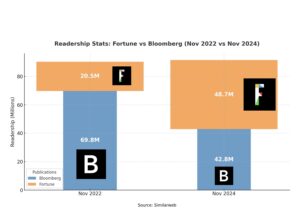
Bloomberg Is Missing An Ingredient. Fortune Has It. Tech PR Needs It, Too.
You need to be logged in to view this content. Please Log In. Not a Member? Join Us

You need to be logged in to view this content. Please Log In. Not a Member? Join Us

Axios and Fortune continue to be star performers in the world of Tier 1 edit, according to the latest data from Similarweb.
From June 2023 through June 2024, Axios increased its readership by 47.5 percent, from 22.5M monthly visitors to 31.1M on a trailing 12-month basis. How does Axios do it? Smart management, smart verticals, smart brevity.
YOUR ACCOUNT
FRIDGE NOTES
Using NLP software, Business Insider assesses how readers will react to its content emotionally, and then sells advertising based on that info. For example, an advertiser can choose to advertise against a story (or video) that makes you feel good or optimistic or pessimistic. This is where content is headed; and this trend may someday affect the way that you pitch.
An avalanche of fake news sites threatens the viability of the web itself. You may need a subscription to read this article, but this publication is definitely worth the money for a subscription.
The former TC star reporter picked a good place to go. Here’s his latest.
When Axios prompted ChatGPT for basic background research on Wealthfront’s confidential IPO filing last week, the bot confidently detailed a Wealthfront investor deck. The problem? It appears to be entirely made up.
Indy media business experts Brian Morrissey and Jacob Cohen Donnelly have built two very successful businesses with both newsletters and face-to-face events. Axios has noticed this and has decided to get into the event space focusing on the economics of publishing, which of course is a topic close to home. Announced this week: an Axios event coming up in September. Hosts: Sara Fischer and Kerry Flynn.